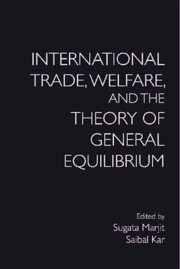Book contents
- Frontmatter
- Contents
- List of Figures and Tables
- Introduction
- 1 Thoughts and Remarks after 50 Years of Simple General Equilibrium Models
- 2 Adjustment Costs and Trade Liberalization
- 3 Farsightedly Stable FTA Structures: The Roles of Preexisting Tariff Rates
- 4 Skilled–Unskilled Wage Inequality and Dynamic Skill Accumulation: A Theoretical Analysis
- 5 FDI in Education vs FDI in Commodity Production: A Theoretical Model
- 6 Skilled Migration and Foreign Aid in a General Equilibrium Model of Monopolistic Competition
- 7 Trade, Factor Flows, and Product Variety in a Small Open Economy
- 8 Product Differentiation, Quality of Innovation, and Capital Mobility: A General Equilibrium Analysis
- 9 Cross-Border Mergers and International Trade: A Vertical GOLE Model
- 10 International Trade and Production Organization: A Review of Contemporary Literature
- 11 Negative Production Externalities, Labor Market Imperfection, and Production Tax Policy in a Developing Economy
- 12 Tax-Financed Public Transfers: A Mechanism for Double Taxation
- Contributors
- Index
Introduction
Published online by Cambridge University Press: 01 November 2018
- Frontmatter
- Contents
- List of Figures and Tables
- Introduction
- 1 Thoughts and Remarks after 50 Years of Simple General Equilibrium Models
- 2 Adjustment Costs and Trade Liberalization
- 3 Farsightedly Stable FTA Structures: The Roles of Preexisting Tariff Rates
- 4 Skilled–Unskilled Wage Inequality and Dynamic Skill Accumulation: A Theoretical Analysis
- 5 FDI in Education vs FDI in Commodity Production: A Theoretical Model
- 6 Skilled Migration and Foreign Aid in a General Equilibrium Model of Monopolistic Competition
- 7 Trade, Factor Flows, and Product Variety in a Small Open Economy
- 8 Product Differentiation, Quality of Innovation, and Capital Mobility: A General Equilibrium Analysis
- 9 Cross-Border Mergers and International Trade: A Vertical GOLE Model
- 10 International Trade and Production Organization: A Review of Contemporary Literature
- 11 Negative Production Externalities, Labor Market Imperfection, and Production Tax Policy in a Developing Economy
- 12 Tax-Financed Public Transfers: A Mechanism for Double Taxation
- Contributors
- Index
Summary
‘It is an absolute miracle of clarity and to-the-point-ness’
– Robert M. Solow, Nobel Prize in Economics, 1987
The General Equilibrium model of international trade has profoundly impacted various sub-disciplines of economics such as development economics, public economics, and environmental economics, among many others. These models continue to inspire younger generations of researchers and are used as essential tools for evaluation of policies. It began with the celebrated contribution of Ronald W. Jones in the Journal of Political Economy in 1965. The following excerpt from a letter written by Robert Solow to Ronald Jones on February 11, 2004, is a testament to the incisiveness and depth of the formulation:
In the course of working again on the elasticity of substitution I found myself rereading your 1965 article on ‘The Structure of Simple General Equilibrium Models.’ In case no one has told you this before, it is an absolute miracle of clarity and to-the-point-ness. Every graduate student in economics should be given a copy. The discipline would be better off. (Robert M. Solow, Winner of Nobel Prize in Economics in the year 1987, Comment on R. W Jones [1965], ‘The Structure of Simple General Equilibrium Models’, published in the Journal of Political Economy).
The excerpt from Solow's letter to his student says it all. His paper on the structure of simple general equilibrium models continues to serve as a theoretical workhorse for many scholars. In 2015, a group of scholars, both senior and young, gathered at the Centre for Studies in Social Sciences, Calcutta, to celebrate 50 years of publication of the article. The event engaged with discussions on a host of contemporary topics in international trade theory and policy highlighting the use of a general equilibrium framework. Central ideas and themes that emerged from these discussions are presented in this volume as cohesive and comprehensive chapters to celebrate a landmark and to record the influence of the idea of general equilibrium in theory and policy. Given that the core theory has ramified along various dimensions, the topics studied in this volume are naturally diverse.
We have classified 12 chapters in 6 sections to accommodate possible questions and coverage that the theory of simple general equilibrium espouses.
- Type
- Chapter
- Information
- Publisher: Cambridge University PressPrint publication year: 2018



